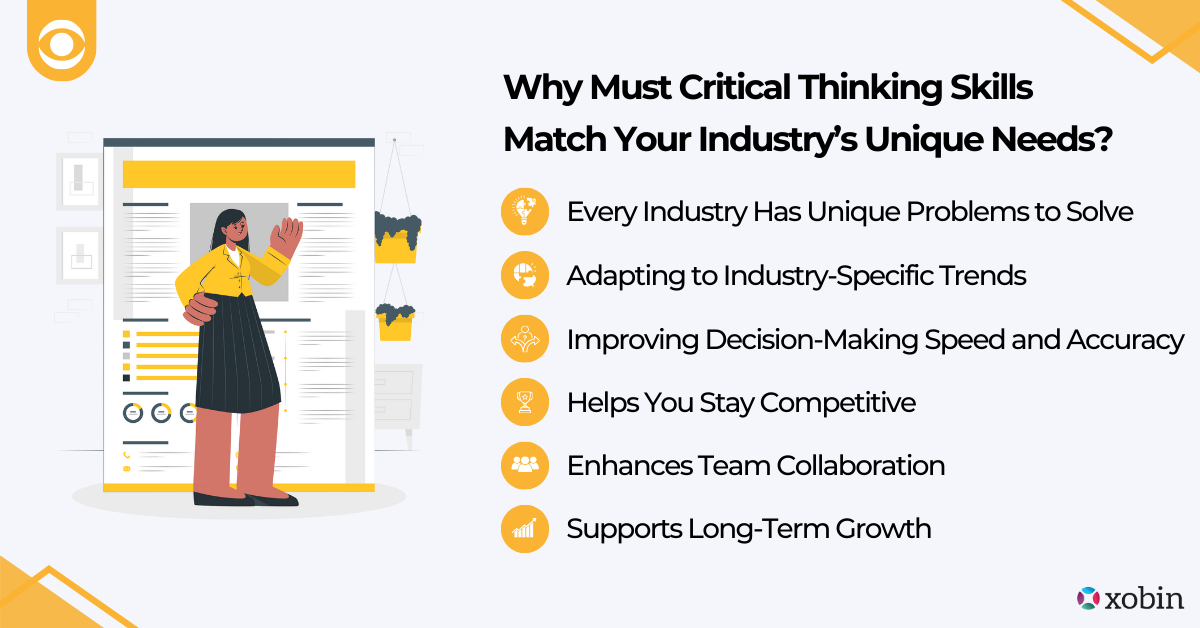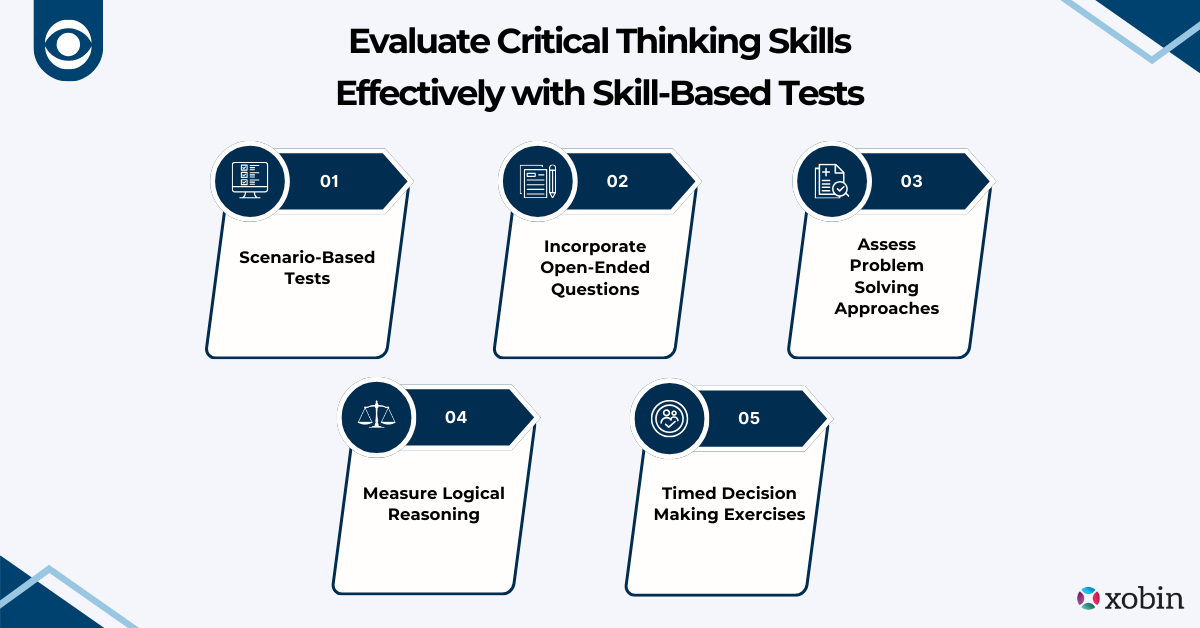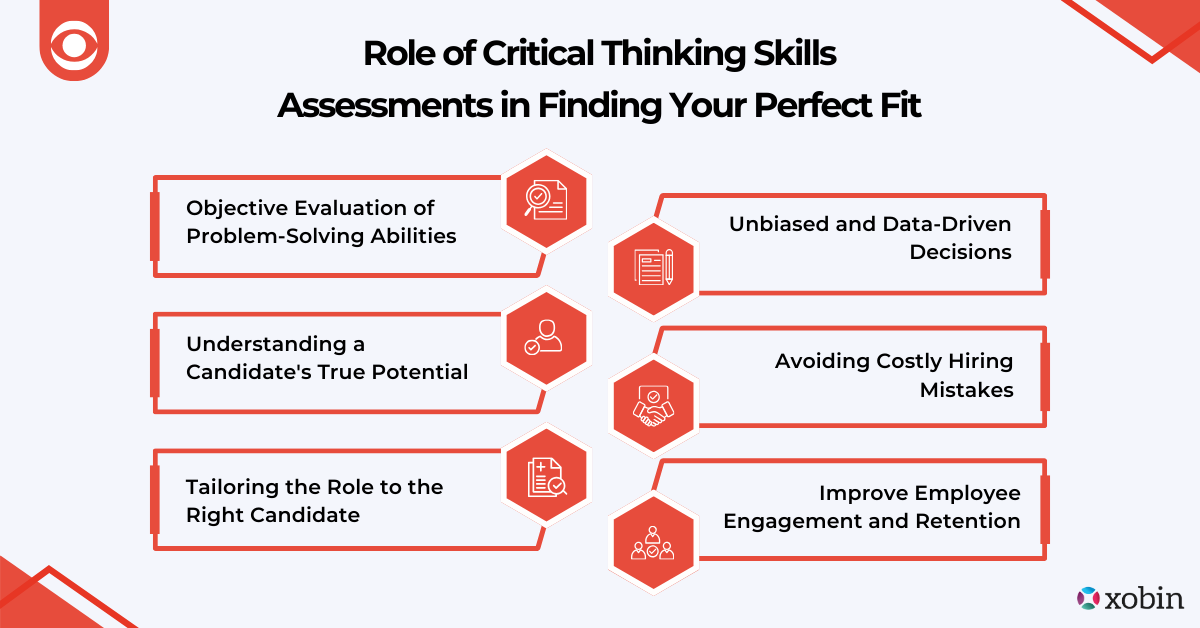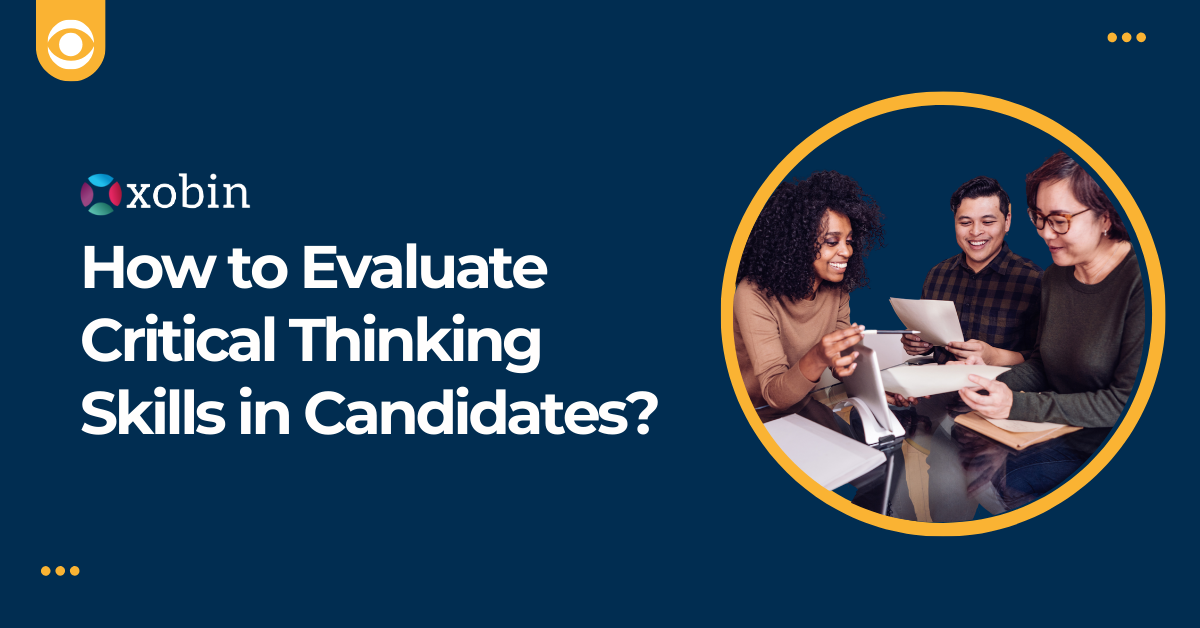In today’s workplace, critical thinking skills are more essential than ever. With complex challenges and decisions requiring careful analysis, employers actively seek individuals who can think critically and solve problems effectively. Strong critical thinking influences everything from project planning to team collaboration, making it a key asset for any organization. One of the most effective ways to assess these abilities during hiring is through a skills assessment tool, which helps evaluate a candidate’s analytical and problem-solving skills objectively. Let’s explore what critical thinking skills involve, why they matter in the workplace, and how to assess them effectively in the hiring process.
Table of Contents
What Are Critical Thinking Skills, and Why They Matter Today?
Critical thinking skills involve the ability to analyze information objectively, evaluate different perspectives, and make well-reasoned judgments. These skills are crucial not only for managers or decision-makers but for individuals at every level of an organization. Rather than accepting information at face value, critical thinkers ask insightful questions, dig deeper into issues, and approach problems from multiple angles.
For instance, in a corporate setting, a manager who possesses strong critical thinking skills is more likely to make informed strategic decisions, address challenges effectively, and identify potential risks before they become problems.
Critical thinking skills empower individuals to:
- Solve problems logically
- Make decisions based on sound reasoning
- Critically evaluate and analyze information
- Adapt to changing situations with a solution-oriented mindset
Additionally, critical thinking is vital for adapting to change. In an ever-evolving world, it enables both individuals and organizations to stay ahead by assessing new opportunities and tackling problems creatively. In fact, a LinkedIn report reveals that 60% of employers prioritize critical thinking when evaluating candidates. This statistic highlights the importance of accurately identifying these skills.
Consider this, how often do your employees encounter situations that require more than just a simple yes or no answer? Whether managing unexpected client demands or optimizing workflows, critical thinking plays a central role in effective problem-solving. A candidate with strong critical thinking abilities won’t simply follow instructions. Instead, they will take ownership, foresee potential issues, and develop innovative solutions.
Why Must Critical Thinking Skills Match Your Industry’s Unique Needs?
There is no one-size-fits-all approach to hiring. Each industry operates in its own unique way, facing specific challenges and requiring tailored problem-solving strategies. Let’s understand why aligning critical thinking skills with your industry’s demands is essential and how it can make a world of difference for your team and business.

Every Industry Has Unique Problems to Solve
You might think critical thinking skills are universal. After all, who doesn’t benefit from reasoning logically or solving problems? While this is true to some extent, the reality is that each industry requires a tailored approach. For example, healthcare professionals need critical thinking to make life-saving decisions under pressure. In contrast, marketing experts might use these skills to interpret customer data and predict trends.
Imagine giving a mechanic the problem-solving tools of a graphic designer. Sounds mismatched, right? That’s because critical thinking in one field doesn’t always translate directly to another. Employers must recognize this difference and hire individuals whose critical thinking aligns with the unique demands of their industry.
Adapting to Industry-Specific Trends
Every sector presents its own unique set of challenges. In the tech industry, for example, rapid innovation requires employees to continuously adapt and think creatively to tackle unforeseen issues. On the other hand, sectors like finance prioritize precision and analytical thinking to manage risks and ensure accurate number crunching effectively.
Now, think about your industry. What are the common obstacles your employees face? Perhaps it’s navigating complex regulations, dealing with supply chain bottlenecks, or managing high-stakes projects. Critical thinking skills tailored to these specific challenges ensure your team doesn’t just survive but thrives.
Improving Decision-Making Speed and Accuracy
Time is money. Industries like manufacturing thrive on precision and efficiency, while others, like startups, often call for quick, iterative decision-making. When employees’ critical thinking aligns with the industry’s rhythm, they can make faster, smarter decisions. Studies show that 70% of high-performing teams have individuals whose problem-solving styles complement the demands of their role. Mismatched skills can lead to delays, second-guessing, or even costly errors.
Helps You Stay Competitive
In fast-moving industries like technology, businesses rely on employees who can adapt to changing trends while solving intricate problems. If your competitors have teams equipped with industry-specific critical thinking skills, you risk falling behind.
Take the tech industry, for instance. Engineers who understand critical systems can anticipate software failures before they happen, giving your product a competitive edge. Without this alignment, you’re just playing catch-up.
Enhances Team Collaboration
Ever notice how some employees just “get it” while others struggle to keep up? That’s often a result of mismatched critical thinking skills. When employees share a similar problem-solving framework tailored to your industry, collaboration becomes seamless.
For instance, in industries like healthcare or logistics, synchronized thinking is essential to ensure smooth operations. If one team member can’t adapt their thought process to align with the industry’s pace, it creates bottlenecks for everyone else.
Supports Long-Term Growth
Hiring employees with critical thinking skills does more than addressing today’s challenges, it equips your organization to thrive in the future. Employees with industry-specific critical thinking skills are more likely to innovate and drive growth.
For example, in the renewable energy sector, critical thinkers who understand environmental policies can foresee market shifts and propose strategies to stay ahead. This foresight becomes a game-changer in securing your company’s long-term success.
Evaluate Critical Thinking Skills Effectively with Skill-Based Tests
Skills testing offer a unique advantage when it comes to assessing critical thinking skills. Unlike traditional interviews, where candidates can rely on memorized answers or rehearsed responses, skill assessments measure a candidate’s ability to think on their feet and solve real-world problems. Here’s why skill tests are so effective in critical thinking evaluation:

Scenario-Based Tests
One of the most effective ways to evaluate critical thinking skills is through scenario-based tests. These tests present candidates with real-life situations that require them to analyze the information, weigh different options, and propose solutions. For example, you might provide a case study related to a business challenge, asking candidates to evaluate various strategies and recommend the best course of action.
Scenario-based tests simulate actual work conditions, making it easier to assess how candidates think under pressure, process complex data, and make well-thought-out decisions. These tests also assess a candidate’s ability to consider multiple perspectives, an important aspect of critical thinking.
Incorporate Open-Ended Questions
Skill tests should include questions that don’t have a single right answer. Why? Because critical thinking is about exploring multiple perspectives and arriving at the best solution. For example:
- What inspired you to pursue your current career path, and how has that journey shaped your perspective?
- Can you describe a challenge you’ve encountered recently and the steps you took to overcome it?
These questions challenge individuals to think deeply, organize their thoughts, and justify their decisions. It’s like peeling back layers of an onion to see what’s at the core.
Assess Problem-Solving Approaches
Simulations that require candidates to solve problems in real time can give you a direct view of their critical thinking abilities. These could include solving technical issues, making decisions based on limited information, or developing strategies to meet specific goals.
Problem-solving tests a candidate’s ability to apply critical thinking in practice. They assess not only logical reasoning but also how candidates approach new and unexpected challenges. This is especially important for roles that require a high level of autonomy and decision-making.
Measure Logical Reasoning
Logical reasoning tests are designed to assess a candidate’s analytical thinking and reasoning abilities. Typically, these tests include puzzles, pattern recognition tasks, and deductive reasoning challenges. By evaluating how effectively a candidate follows a logical sequence of ideas, these tests offer valuable insights into their cognitive capabilities.
These assessments focus primarily on problem-solving skills, which are essential for critical thinking. As a result, candidates who perform well tend to excel in handling complex situations, solving problems, and applying logical thought processes.
Timed Decision-Making Exercises
Timed exercises that challenge candidates to make decisions quickly can help assess their critical thinking under pressure. These tests often present problems or scenarios where candidates must analyze data or solve puzzles within a time limit, providing insight into their decision-making speed and accuracy.
Time pressure can demonstrate the conditions of a fast-paced work environment, allowing you to assess how well candidates think critically while under stress. It also tests their ability to prioritize tasks and make decisions swiftly.
Role of Critical Thinking Skills Assessments in Finding Your Perfect Fit

Objective Evaluation of Problem-Solving Abilities
Traditional interview questions, while insightful, can sometimes be limited in their ability to gauge a candidate’s real-time problem-solving abilities. Critical thinking skills assessments take the guesswork out of the equation by presenting candidates with real-world scenarios and testing their ability to think on their feet. These assessments measure how well a candidate can analyze, evaluate, and synthesize information.
For example, a well-designed assessment might ask candidates to analyze a business case or solve a problem that requires logical reasoning and strategic thinking. This allows you to assess their approach and ability to come up with thoughtful solutions.
Unbiased and Data-Driven Decisions
Bias can unintentionally creep into the hiring process. Maybe a candidate’s alma mater impresses you, or their charming personality influences your opinion. While these factors shouldn’t overshadow competence, they often do.
This is where critical thinking skills assessments bring balance. They provide measurable data on a candidate’s cognitive abilities, helping you make decisions based on merit rather than gut feelings. With standardized results, you can compare candidates fairly and confidently.
Understanding a Candidate’s True Potential
Interviews and resumes sometimes only offer a partial picture of a candidate’s actual skills. While candidates may excel at discussing their past experiences, they might struggle when confronted with a real challenge. This is where critical thinking skills assessments become invaluable. These online assessments go beyond surface-level details to evaluate how candidates process information, handle ambiguity, and make decisions.
For example, if you’re hiring for a managerial position, you’d likely want someone who can manage competing priorities while making sound decisions. Critical thinking assessments offer valuable insights into whether a candidate possesses the intellectual agility necessary for the role.
Avoiding Costly Hiring Mistakes
Hiring the wrong person can cost more than just money—it affects productivity, morale, and even your team’s cohesion. Studies show that companies lose up to 30% of an employee’s first-year earnings when they hire poorly. Critical thinking assessments act as a safety net. They ensure you’re not just hiring someone who sounds good in an interview but someone who can perform under pressure.
These tests simulate real-world situations, highlighting how candidates think quickly. It’s like giving them a sneak peek into the challenges they’ll face on the job, helping you identify who’s genuinely ready for the role.
Tailoring the Role to the Right Candidate
Have you ever felt like you hired a high potential employee, but they weren’t quite the right fit for the role? Critical thinking assessments help prevent this mismatch. By identifying a candidate’s strengths and areas for improvement, these tests offer a clearer picture of where they’ll excel. For example, a candidate with strong logical reasoning but moderate creative thinking might thrive in analytical roles but struggle in highly innovative ones. Understanding these nuances ensures you place the right person in the right role.
Improve Employee Engagement and Retention
When you hire candidates with strong critical thinking abilities, you’re more likely to see higher engagement levels. Employees who feel confident in their ability to solve problems and contribute to decision-making processes are more likely to stay motivated and loyal to the company. Additionally, these employees contribute to a culture of innovation, which helps the organization stay competitive. As a result, performance improves, and turnover rates decrease.
Hire Smarter with Xobin’s Critical Thinking Tests
At Xobin, we recognize the crucial role that strong critical thinking skills play in the hiring process. That’s why our pre-employment assessments are carefully crafted to evaluate how candidates approach complex problems, interpret information, and make reasoned decisions. With Xobin’s standardized assessments that are validated with psychometric properties, you can confidently identify individuals who possess the critical thinking skills essential for success in your organization.
Our platform also offers flexibility, allowing you to customize assessments based on your specific organizational needs. Whether you’re seeking leaders, problem-solvers, or analytical thinkers, Xobin can help you find the perfect match. From situational judgment tests to problem-solving exercises, our tools enable you to accurately assess and hire candidates with strong critical thinking abilities. Evaluating critical thinking skills doesn’t have to be a challenging task. With Xobin’s critical thinking tests, you can streamline the hiring process, making it faster and more efficient. Moreover, these tests ensure a bias-free selection, helping you confidently choose the best candidates for the role.
Not sure where to begin? Xobin eliminates the guesswork in assessing critical thinking skills, helping you hire top talent with the right capabilities.
Ready to take the next step? Explore our extensive skills inventory of over 3400+ skills tests or book a personalized demo today to get started.






